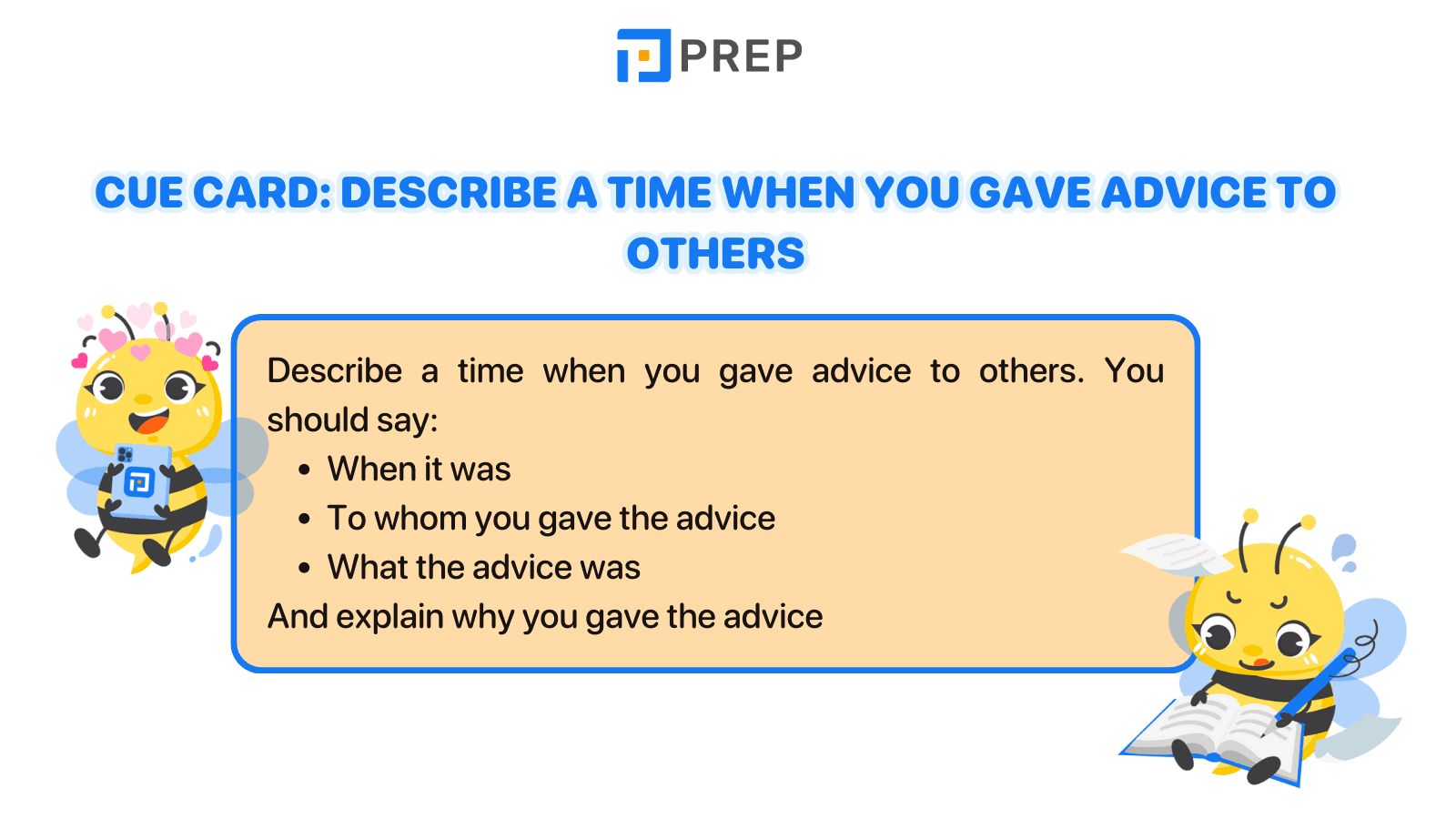Sample Speaking Part 2, 3: Describe a time when you gave advice to others
"Describe a time when you gave advice to others" or "Describe a time when you gave advice to someone" is an IELTS Speaking Part 2 topic that falls under the category of "Describe a situation" (describing an event or experience). To tackle this topic most easily, you need to come up with an idea for the speech, and plan out your Part 2 response before you start speaking. Refer to the article on the topic "Describe a time when you gave advice to others" below to effectively practice for the IELTS Speaking test at home!

I. IELTS Speaking Part 2 question and answer: Describe a time when you gave advice to others
1. Cue card: Describe a time when you gave advice to others
Describe a time when you gave advice to others. You should say:
-
When it was
-
To whom you gave the advice
-
What the advice was
And explain why you gave the advice

2. Outline: Part 2
2.1. Sample idea
-
To solve the topic Describe a time when you gave advice to others, we will need to use past tenses to talk about past actions.
-
This topic is slightly different from other IELTS speaking topics. Rather than jumping straight into the issue, we need to describe the context of the story. Therefore, this part should take about ⅓ of the entire speaking response.
-
Next, we should move on to discussing what advice we gave the other person and why we advised them in that way. The advice given here should be as detailed as possible.
-
Finally, in the Describe a time when you gave advice to others topic, talk about whether the person followed your advice and what the result was. At the end of the Describe a time when you gave advice to others speaking response, include your own and the other person's thoughts and feelings.
2.2. One-minute note taking
In IELTS Speaking Part 2, candidates are given a task card with a topic and are required to speak for 1-2 minutes. To prepare for this, you are typically given 1 minute to make some notes before you start speaking.
This one-minute note-taking period is an important part of the task. It allows you to quickly organize your thoughts, brainstorm key points, and structure your response before you start speaking. Effective note-taking can help you:
|
|
|
|
3. IELTS Speaking Task 2 samples: Describe a time when you gave advice to others
Below is the most comprehensive IELTS Speaking Part 2 answer for the topic Describe a time when you gave advice to others, written by the teachers at PREP. Review it right away to effectively practice IELTS Speaking at home!

Let's take a look at IELTS Part 2 Speaking examples - Describe a time when you gave advice to others:
When I was in high school, I experienced a situation that I had never thought that I would be in. In the middle of the night, my best friend suddenly knocked on my door, begging me to let her in. I could feel the resentment that she was giving off. Well, turns out she had a feud with her mother about the future career.
The fight was so fierce that she said she decided to move out straight away and pursue her dream job, which was to become a graphic designer despite the fact that her mom and the whole family preferred her to be a teller at a bank. They all thought doing a design job would never provide her with a stable life both mentally and financially. .
I sneaked her inside. Once she was in my bedroom, we had a heart-to-heart conversation for the whole night. One advice that I gave her was that she should go home in the next day since it was no use running away like that. The way she went into a sulk was just like when children didn’t get the toys they wanted from their parents.
I told her that instead of holding a grudge against her parents, she should take the initiative to explain her studying plans and employment prospects if she decided to join the design field. They were just having a poor judgment of the job, so having a serious talk would somehow make them understand more. She did cry a little bit when we were chatting, but I think that was a good sign because she didn’t let her emotions pile up. In the end, she came home the following day.
What surprised me was that she actually listened to my advice, and as a result, my friend’s relationship with the family improved substantially. It was a moment to remember, to the point that we still laugh about how childish and impulsive the situation was until this day.
Note: This IELTS Speaking Part 2 sample response can also be used for other sample topics such as: Describe a time when someone asked you for your opinion; Describe a time you gave advice to others; Describe a time when you gave some helpful advice to someone; Describe a time that you gave advice to others; etc.
Having a strong vocabulary is crucial for success in IELTS Speaking Part 2. This section requires you to speak at length about a given topic, so having a diverse range of words at your disposal is essential. The examiner will be assessing your lexical resource - your ability to use a wide vocabulary, including less common and idiomatic terms. Focusing on expanding your vocabulary, especially topic-specific words and collocations, will allow you to describe things in more detail, use more precise language, and demonstrate your command of the English language. Ultimately, a rich vocabulary can help you achieve a higher band score in this challenging part of the IELTS Speaking test.
Review some vocabulary used in the IELTS Speaking Part 2 sample response on the topic Describe a time when you gave advice to others:
-
Beg (verb): to plead earnestly
-
Resentment (n): a feeling of indignant displeasure
-
Feud (n): an ongoing conflict
-
Teller (n): a bank employee who handles customer transactions
-
Cram (v): to push or squeeze tightly into a space
-
Heart-to-heart (n): an intimate and sincere conversation
-
Go into a sulk: to become sullen and withdraw
-
Grudge (n): a persistent feeling of ill will
-
Take the initiative (v): to act on one's own
-
Pile up (v): to accumulate in a heap
-
Impulsive (adj): acting without deliberation
II. Sample IELTS Speaking Part 3: Advice
Let's listen to the IELTS Speaking Part 3 sample response - Advice:
1. Is it better to get advice from a friend or from a family member?
Most of the time, people would ask their friends for advice since people in the same generation are likely to grasp the situation faster. So what I’m trying to say is that friends are better advisors. Sometimes, when we ask parents for some recommendations, it would turn into an unwanted life lesson.
They may condemn our weaknesses, not being able to tough it out alone whereas friends’ word delivery is far more gentle. A sympathetic attitude is easily noticed from friends as they also experience the same pressure at a point of their lives.
-
Condemn (v): to criticize severely
-
Tough it out: to deal with difficulties courageously
-
Sympathetic (adj): showing understanding and care for others
2. What would you say are the characteristics of a good adviser?
I guess how knowledgeable that person is, well in both academic and social aspects, plays a vital role when identifying a wise consultant. An advisor needs to be erudite so that he or she can consider a situation in a multi-dimensional viewpoint. Therefore, the advice can be more accurate for the one who is in need. Moreover, being objective is one of the features that an advisor should have. The best suggestion is one that doesn’t let personal feelings get in the way.
-
Erudite (adj): having or showing great knowledge or learning
-
Multi-dimensional (adj): having many different aspects or facets
-
Objective (adj): not influenced by personal feelings or opinions; impartial
-
Get in the way: to hinder or obstruct
3. Should people make their own work and career decisions, or is it a good idea to ask for advice about this?
I would say that for youngsters, they should always go to their parents to discuss their future career, especially ones who have never done an official job or been involved in a legal contract. Nonetheless, for experienced workers, the people should trust their instincts and do what works best for them. This may bring uphill struggles, but they need that to break new grounds. Well, I’m not rejecting others’ goodwill, but sometimes the individuals who are doing the actual job know what’s the most effective way.
-
Instinct (n): a natural intuitive way of acting or behaving
-
Uphill struggle (n): a difficult and challenging task or endeavor
-
Break new grounds (n): to do something innovative or groundbreaking
-
Goodwill (n): a friendly, cooperative, or helpful attitude
This article has provided a sample IELTS Speaking Part 2, 3 response on the topic "Describe a time when you gave advice to others", compiled by the teachers at PREP. Review it to understand how to develop the ideas, structure the response, and see the sample response. Additionally, make sure to note down these key vocabulary words in your notebook to help build your topic-specific vocabulary!

Hi I'm Chloe, and I am currently serving as an Product Content Administrator at Prep Education. With over five years of experience in independent online IELTS study and exam preparation, I am confident in my ability to support learners in achieving their highest possible scores.
Comment
Premium content
View allPersonalized roadmap
Most read












